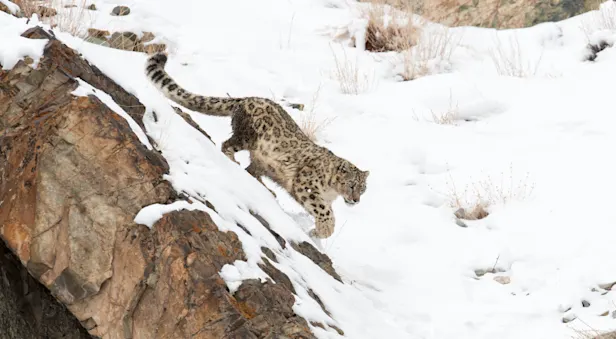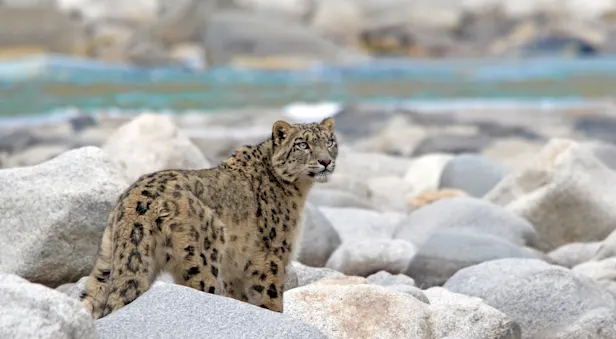
Know Before You Go
Conservation | Snow Leopards of the Himalayas
The snow leopard’s habitat range extends across the mountainous regions of 12 countries across Asia: Afghanistan, Bhutan, China, India, Kazakhstan, Kyrgyz Republic, Mongolia, Nepal, Pakistan, Russia, Tajikistan, and Uzbekistan. The total range covers an area of close to 772,204 square miles, with 60% of the habitat found in China. However, more than 70% of snow leopard habitat remains unexplored. Home range sizes can vary from 4.6-15.4 square miles in Nepal to over 193 square miles in Mongolia. And population density can range from <0.1 to 10 or more individuals per 38.6 square miles, depending on prey densities and habitat quality. Nevertheless, the snow leopard population is very likely declining.
Snow leopards play a key role as a top predator, an indicator of the health of their high-altitude habitat, and, increasingly, an important indicator of the impacts of climate change on mountain environments. If snow leopards thrive, so will countless other species and the largest freshwater reservoirs of the planet.
THREATS
The sole predator of snow leopards? Humans. Hunting, habitat loss, declines in natural prey species, and retaliatory killings resulting from human-wildlife conflict are the main reasons this big cat is under threat. The other major impact on snow leopard survival is the climate crisis. Rising global temperatures can severely impact alpine habitat productivity which in turn can impact prey and freshwater availability in the harsh mountainous environment.
CLIMATE CRISIS
The climate crisis poses perhaps the greatest long-term threat to snow leopards. Impacts from a warming planet could result in a loss of up to 30% of the snow leopard habitat in the Himalayas alone.
ILLEGAL WILDLIFE TRADE
Across most rangelands, wildlife population densities have been declining due to the illegal wildlife trade. Snow leopards are poached for the illegal trade. They have long been killed for their beautiful fur, but their bones and other body parts are also used in traditional medicine. And this illegal trade seems to be increasing due to market demand for their parts.
RETALIATORY KILLINGS
Snow leopards are often killed by local farmers and herders as a result of human-wildlife conflict, which occurs when the leopards prey on livestock such as sheep, goats, horses, and yak calves. The animals that snow leopards would typically hunt—such as the argali and blue sheep—are also hunted by local communities. Snow leopards also lose out on habitat and food sources to livestock. As their natural prey becomes harder to find, snow leopards are forced to kill livestock for survival.
HABITAT FRAGMENTATION
The snow leopard habitat range continues to decline from the impacts of the climate crisis, human disturbance, and increased use of grazing space. This development increasingly fragments the historic range of the species.
WHAT WWF IS DOING
WWF’s work focuses on managing human-leopard conflict and rural development, education for sustainable development, stopping mining, and reducing impacts of linear infrastructure development in fragile snow leopard habitat, and the control of the illegal wildlife trade.
STOPPING ILLEGAL TRADE
WWF supports mobile antipoaching activities as a way to curb the hunting of snow leopards and their prey. Together with TRAFFIC, the wildlife trade monitoring network, we work to eliminate the illegal trade of snow leopard fur, bones, and other body parts.
WORKING WITH COMMUNITIES
WWF understands there are extraordinary opportunities for conservation to help local people and wildlife live and prosper together. In the Eastern Himalayas, WWF works with local communities to monitor snow leopards and reduce the retaliatory killing of them through supporting communities install predator-proof pens for their livestock, community livelihood enterprises, and innovative local insurance plans.
WWF also works on awareness programs for students and communities at large, including with goat herders in Mongolia to build awareness about the plight of the snow leopard to reduce the killing of snow leopards as retaliation for killing livestock. Through the Land of Snow Project, WWF aims to secure key areas of snow leopard habitat in Mongolia.
































